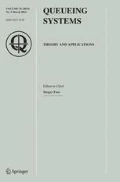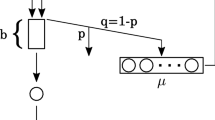Abstract
This paper considers queueing systems without buffer. The problem is finding an optimum discipline that gives the minimal number of request discards in a given interval or the minimum discard probability. In the case of a single server fed by an arbitrary request input flow, it is proved that the discipline that discards the request having the maximum residual life is optimal. This result is extended to the system with more than one server. For G/G/1/0, it is given a condition under which the discipline that discards the request in service minimizes the discard probability. Also for a G/G/1/0, we state the problem of finding optimum discipline in terms of the discrete age Markov chain. The problem of minimization of one-step discard probability is stated. It is solved for a system with C servers and general point process of new arrivals.
Similar content being viewed by others
References
R. Bellman, Dynamic Programming (Princeton Univ. Press, Princeton, NJ, 1957).
P. Bender, M. Canoy, B. Mohanty, R. Pankaj and B. Tsybakov, Method and apparatus for efficient use of communication resources in a data communication system under overload conditions, Patent pending (2001).
cdma2000 high rate packet data air interface specification, TIA/EIA/IS-856 (23 August 2001).
J.W. Cohen, On networks with generalized processor sharing (and a new property of Erlang's B formula), in: ITC-9, 1979, pp. Cohen.1-7.
R. Conway, W. Maxwell and L. Miller, Theory of Scheduling (Addison-Wesley, Reading, MA, 1967).
M.E. Crovella and A. Bestavros, Self-similarity in World Wide Web traffic: Evidence and possible causes, IEEE/ACMTrans. Networking 5 (May 1997) 835-846.
R.M. Fortet, Random distributions with an application to telephone engineering, in: Proc. of Berkeley Symposium on Mathematical Statistics and Probability, Vol. 2, 1956, pp. 81-88.
B.V. Gnedenko and I.N. Kovalenko, Introduction to Queueing Theory (Israel Program for Scientific Translation, Jerusalem, 1968).
R. Howard, Dynamic Programming and Markov Processes (MIT Press, Cambridge, MA, 1960).
L. Kleinrock, Queueing Systems, Vol. 1 (Wiley, New York, 1975).
L. Kleinrock, Queueing Systems, Vol. 2 (Wiley, New York, 1976).
S.M. Ross, Stochastic Processes (Wiley, New York, 1996).
L.I. Sennott, Stochastic Dynamic Programming and the Control of Queueing Systems (Wiley, New York, 1999).
B.A. Sevastianov, Limiting theorem for Markov processes and its application to telephone systems with losses, Probab. Theory Appl. 2(1) (1957) 106-116.
H. Takagi, Queueing Analysis; A Foundation of Performance Evaluation, Vols. 1-3 (Elsevier Science/North-Holland, Amsterdam, 1991).
B.S. Tsybakov, Probability of heavy traffic period in third generation CDMA mobile communication, Mobile Networks Appl. 6 (2000) 463-470.
M. Zelen, Reliability and life testing, International Encyclopedia of Statistics, Vol. 2, eds. W.H. Kruskal and J.M. Tanur (1978) pp. 812-817.
Author information
Authors and Affiliations
Rights and permissions
About this article
Cite this article
Tsybakov, B. Optimum Discarding in a Bufferless System. Queueing Systems 41, 165–197 (2002). https://doi.org/10.1023/A:1015738003338
Issue Date:
DOI: https://doi.org/10.1023/A:1015738003338




